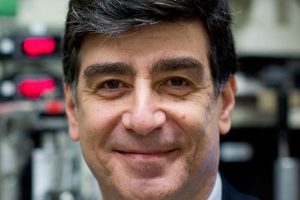
*Note: The seminar will be immediately followed by a reception in the Clipper Room, Shriver Hall.
Abstract: In this presentation we use continuum thermodynamics of pure thermoelastic fluids (such as water) to examine their phase transformation. Our approach employs the specific free energy as the main function of state that needs to be characterized to completely describe the properties of a thermoelastic fluid. To examine phase transformation kinetics, a special emphasis is placed on the jump condition for the axiom of entropy inequality, thereby recovering the conventional result that stable phase equilibrium coincides with continuity of temperature, pressure, and free enthalpy across the phase boundary. Moreover, this jump condition leads to the formulation of a constitutive relation for arbitrary phase transition kinetics under non-equilibrium conditions, showing that phase transformations must be accompanied by a jump in temperature across the phase boundary. Encouraging agreement is found between the formulation of this study and limited available experimental data. Further evidence is needed to conclusively validate this proposed constitutive model. This continuum framework is well suited for implementation in a computational framework, such as the finite element method.
Bio: Dr. Gerard Ateshian received his BS (1986), MS (1987), MPhil (1990) and PhD (1991) degrees in mechanical engineering from Columbia University. He is a Fellow of the American Society of Mechanical Engineers, the Biomedical Engineering Society, and the American Institute of Medical and Biological Engineers. He has been Professor of Mechanical Engineering and Biomedical Engineering at Columbia University since 2002 and the Andrew Walz Professor of Mechanical Engineering since 2013. Dr. Ateshian performs research in the field of soft tissue mechanics, with an emphasis on cartilage mechanics, lubrication, and tissue engineering, and the formulation of growth theories for biological tissues. A major component of his research focuses on understanding and treating osteoarthritis. Ateshian is particularly interested in formulating continuum mechanics theories that accommodate the complexities encountered in living biological tissues and cells, including mass transport, osmotic effects, and reactive mechanics in solid mixtures, needed to describe tissue growth and remodeling. Dr. Ateshian has received prestigious awards, including the OARSI Basic Science Award (2013) and the H.R. Lissner Medal, ASME (2017).
Website: https://www.me.columbia.edu/faculty/gerard-ateshian
Host: Jill Middendorf